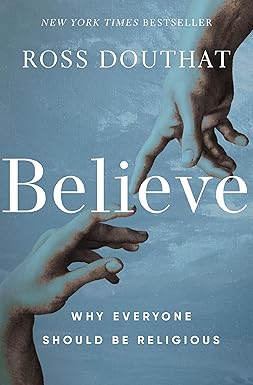
True story: I got this book from the Portsmouth (NH) Public Library. But only after failing to find it in the "New Non-Fiction" area, but noticing that it had been placed on the "New Fiction" table. I assume that was due to some jerkwad Portsmouth atheist thinking he was clever.
But for the rest of us, this is a really excellent book. The author, Ross Douthat, is not some Bible-thumping yokel, but a columnist for the New York Times (and movie reviewer for National Review). He can, and does, speak the language of urban sophisticates. Although, thank God (or whoever), I'm not one of those.
Douthat's argument for "believing" is laid out carefully in stages. In the early going, he makes some powerful points that indicate a universe, planet, environment, and nature that screams "not an accident". If the fundamental physics of reality were just slightly different, there could be no elements, no galaxies, no biology, … And even if you accept that dice-throw, there are further unlikely happenstances: the complex interactions between life and environment involving convoluted biochemical pathways to keep things moving and procreating.
And don't get me started on free will, consciousness, and the moral sense most of us have.
And we are supposed to believe that all this sorta fell together by sheer chance and accident? Brother, pull the other one.
After that, Douthat starts moving up the mountain of faith. He notes the prevalence of seeming inexplicable occurrences of the mystic and supernatural. He argues against exploring the spiritual on your own; that would be like trying to conduct particle physics research from scratch. Instead, be like Newton, and "stand on the shoulders of giants", taking the accumulated wisdom of millennia as a given.
And finally, he recounts his own path, from childhood Episcopalianism to his mainstream Roman Catholic faith today.
All in all, a fine read. I'm not going back to the pews myself this Sunday morning, but I look at the folks who do with considerable extra respect.
![[The Blogger]](/ps/images/barred.jpg)



